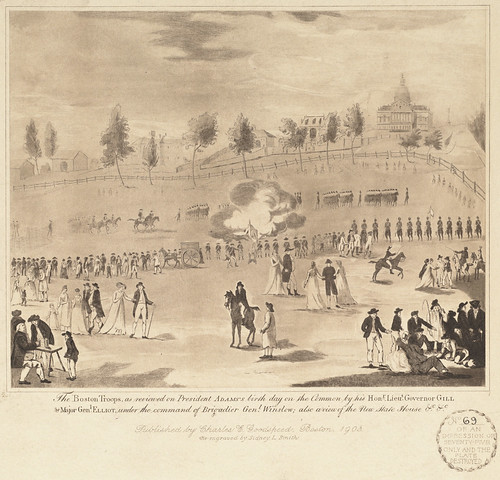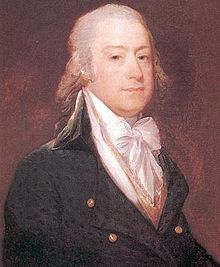When
George Washington arrived in
Cambridge on 2 July 1775, he took over command from Gen.
Artemas Ward. The
Continental Congress made Ward its second-ranking general.
There doesn’t seem to be any evidence that Ward resented having Gen. Washington installed over him. He was a politician as well as a military man, and he was probably aware of the Massachusetts delegates’ hope to secure the other colonies’ support for a
Continental Army by letting them name its commander-in-chief.
During the
siege of Boston Washington gave Ward command of the southern wing of the American line. The Massachusetts general had overseen the Battle of
Bunker Hill, the event that convinced the British army commanders there was nothing to be gained by staying in Boston. (Gen.
William Howe stayed over the winter only because it took so long for the government in London to agree with that strategy.) Ward was also the chief voice for putting
cannon on
Dorchester Heights, the move that eventually made Howe
sail away. So Ward’s contributions were crucial to the success of that first campaign.
Yet he rubbed Washington the wrong way. I sometimes wonder if Washington didn’t get along with Ward because they were too similar in some ways and too different in others. Most of the other generals were significantly older (
Spencer,
Putnam,
Thomas) or younger (
Sullivan,
Heath,
Greene). But Ward was in his forties, just a few years older than Washington. Both men had been provincial colonels during the
French &
Indian War, seeing major British campaigns in a subordinate capacity. Both were highly respected gentlemen and legislators in their home colonies.
Yet Ward had the qualities that New England respected: a
Harvard education, Calvinist piety. He was conscientious and cautious, moving carefully to be certain he was moving in the right direction, a leader through finding consensus rather than bold strokes. Washington was a Virginian. He had no college education, and he was more philosophical than
religious. Especially in those early years of the war, he liked bold strokes. He kept proposing bold strokes against the British inside Boston. And all the other generals, with Ward speaking first as the highest-ranking, kept voting him down.
By the end of the siege, Washington didn’t have much respect for his second-in-command. On 1 Apr 1776 he told his former military secretary
Joseph Reed that “Nothing of Importance has occurr’d—in these parts” except perhaps for Ward resigning and then rescinding his resignation:
on Acct, as he says, of its being disagreeable to some of the Officers—who those Officers are I have not heard. I have not enquired—When the Application to Congress & notice of it to me, came to hand, I was disarm’d of Interposition because it was put upon the footing of Duty, or conscience, the General being perswaded, that his health would not allow him to take that share of Duty that his Office required. the Officers to whom the resignation is disagreeable have been able, no doubt, to convince him of his mistake, and that his health will admit him to be alert and Active—I shall leave him till he can determine Yea or nay, to Command in this Quarter.
Washington was even more caustic in comments to Gen.
Charles Lee on 9 May:
General Ward, upon the Evacuation of Boston, and finding that there was a probability of his removing from the smoke of his own Chimney, applied to me, & wrote to Congress, for leave to Resign—A few days afterwards (some of the Officers, as he says, getting uneasy at the prospect of his leaving them) he applied for his Letter of Resignation, which had been committed to my care; but behold! it had been carefully forwarded, and as I have since learnt judg’d so reasonable—want of health being the Plea—that it was instantly complied with.
Lee evidently brought out the cattiness in the commander-in-chief.
As it turned out, the Congress accepted Ward’s offer to stay on—though it kept him away from Washington. Gen. Ward oversaw the “Eastern Department,” or New England, until March 1777, when he reported that the region was so quiet that he didn’t deserve his salary and stepped down. Later, in 1780-82, Ward represented Massachusetts in the Continental Congress itself.
Meanwhile, at the end of 1776 Washington learned that Lee and Reed were writing about him critically behind his back. He never wholly trusted either man again. As a result, his later letters to those men aren’t nearly so fun.
Ten years after Lee died in 1782, a former Congress delegate from Georgia named
Edward Langworthy published
Memoirs of the Life of the Late Charles Lee. That book included some of the late general’s correspondence—including Washington’s May 1776 letter that referred to Ward in less than flattering terms.
When that letter became public in 1792, Ward was serving the first of his two terms in the new U.S. Congress. Generally he voted with the Federalists and President Washington. But now they had a personal matter to sort out.
TOMORROW: Two former generals in one room.








,+1793..jpg)





